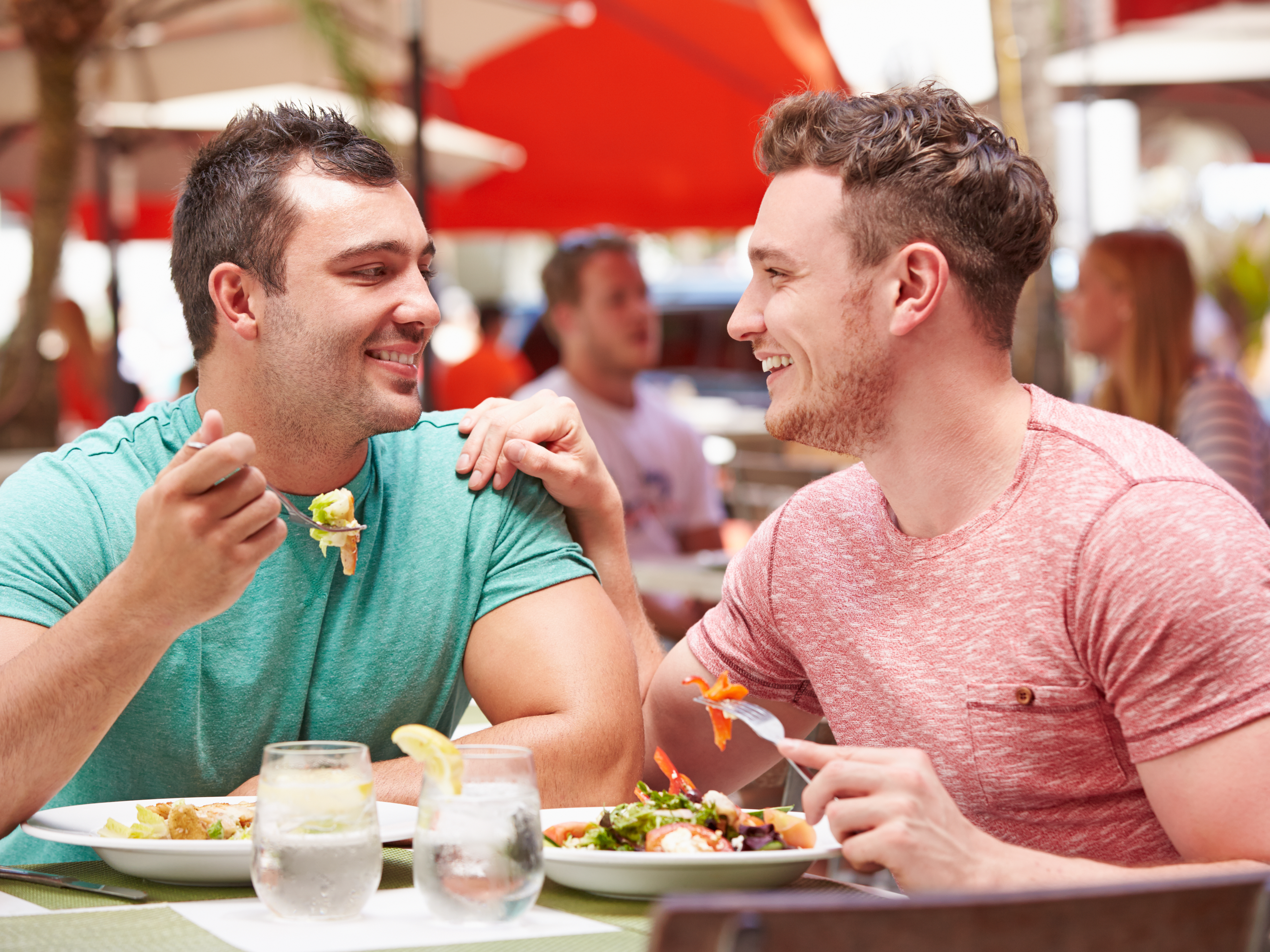- Many queer couples have found themselves not read as couples in social settings.
- Adam Blum, the founder and director of the Gay Therapy Center, says moments like these are invalidating – and can make you feel lesser than.
- When these moments occur, you should take a moment for yourself, acknowledge your feelings, and decide if it’s worth educating the other person.
- Heterosexual allies can make spaces more open by asking how couples refer to each other, and asking the same questions they would ask heterosexual friends.
- Visit Business Insider’s homepage for more stories.
It’s an uncomfortable situation queer couples know well: That moment when you’re out at a restaurant, or a store, or at a dinner party and are asked how you and your “friend” are, or how long you’ve been friends. Even when you’re sitting across from each other on Valentine’s Day.
In the moment, outing yourself is still a risk. Almost 19% of reported hate crimes in 2018 targeted people for their sexual orientations – and that number increased from 2017 to 2018. It’s difficult to parse when someone is unintentionally misreading the situation, or has more malicious motives.
But this illegibility can also feel at odds with prevalent attitudes surrounding the queer community. A 2019 Gallup poll found that 63% of respondents believed gay marriage should be recognized as valid – and 93% thought that gays and lesbians should have equal rights in terms of job opportunities.
So why does the phenomenon of misreading same-sex couples as “just friends” persist? And why does it feel so bad?
Adam Blum, founder and director of the Gay Therapy Center, said that discomfort around couples being misread can stem from an issue of validation. Simply put: You don't get the same level of recognition or validation that a heterosexual couple may get when entering a space.
"In many spaces, your same-sex relationship doesn't quite seem to get the same level of interest," Blum told Business Insider. "Things have changed quite a bit, even now, especially in some of the big coastal cities, but even there, you know, it still happens."
Blum said that he "constantly" sees clients coming in who are contending with the "impact of not being validated."
And for queer people who already identify as minority-aligned - whether along lines of race, class, or gender - this lack of validation can lead to a doubled marginalization at home.
"When you are a minority, you're under a minority stress. And something unique about queer minorities is that they're not only minorities in a culture, they're minorities in their own intimate families. So that's a whole other layer of psychological wounding that we all have to confront as queer people."
So what should you do when that new acquaintance at a party asks how long you've been friends? Blum has five steps you can take if you and your partner have been misidentified.
Acknowledge how you're feeling

When you're misidentified, it's key to acknowledge how you're feeling. Otherwise, you can easily internalize that reading of your relationship - and find yourself feeling like you don't stack up against more easily legible heterosexual couples.
"It's very subtle, but you can walk around feeling you're just slightly not as good," Blum said. "Your relationship is not quite as legitimate as that one at the other table because the other table has gotten so much more social validation."
Allow yourself to feel the hurt or anger or annoyance at that moment, and identify it for what it is.
Next, take a breath

Taking a moment to pause can help you relax and ground yourself after a frustrating interaction - and help you understand what you're experiencing.
"We want to kind of slow it down, because those feelings can come fast," Blum said. "If we take a breath, we can slow it down and just become a little bit more aware of what's going on right now."
Make a choice whether to let it go — or turn it into a teaching moment

Blum said there's nothing wrong with taking a pass on educating someone.
In other words, you don't have to use your romantic dinner or date as a PSA - it's okay to just let it go in the moment. Outing yourself can always come with risks. You don't need to put you or your date in potential danger.
But if you're in a setting where you feel comfortable doing so, educating whoever made the assumption can be a viable option. Blum said that you should avoid trying to "attack" them for their comment - it may shut down the discussion immediately.
"If you attack a person, there's a very high likelihood that they really won't hear you and there'll be no change," Blum said.
Instead, refocus on something indisputable: your own feelings about the situation.
"No one can say to you, 'You're not feeling this disrespected,'" Blum said. "No one's going to say that to you. You are the owner, you are the expert of your own feelings. So by simply saying, 'I feel we're disrespected,' hopefully that might evoke some interest and perhaps attention and compassion."
Blum said this could arouse the other person's curiosity, instead of sending them straight into defensive mode.
"Being honest about how you felt - it's a brave and very powerful way of communicating to someone that you're trying to reach rather than shut them down."
Seek out support from queer friends

Establishing a queer network can be a crucial balm, according to Blum. The power of queer friendships has been researched and theorized about at length, and for good reason - the phenomenon of queer "chosen families" is often rooted in rejection by biological families.
Complaining with queer friends when this type of misidentification happens can be healthy, and allows you to ground yourself among people who have been there and done that.
"I think to undo the impacts of a homophobic world, it's very healthy for most queer people to have at least one intimate friendship with a queer person who's gonna support you and commiserate and validate and share their own same experiences," Blum said.
How straight allies can prevent these situations

For straight allies, it can be difficult to comprehend their own role in situations like this. And many may feel awkward or worried about offending the potential couple. But Blum said straight allies should feel free to ask questions - the people they're with might appreciate it.
For instance, asking how people prefer to be addressed can make a big difference. If you would ask a heterosexual couple in the same situation if they're married, do the same here. Ask them what words they use to address each - like spouse or partner or boyfriend.
Normalizing these practices can be both meaningful to your queer friends, and usher in larger change.
"Faster change occurs when the majority takes some responsibility for trying to create a more equal social environment," Blum said.
